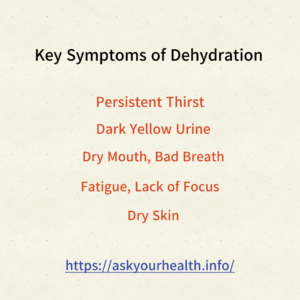
Signs You’re Not Drinking Enough Water, Water is essential for maintaining life. Every cell, organ, and tissue in your body relies on proper hydration to function effectively. However, in our busy daily lives, many people fail to drink enough water, leading to various negative health effects. Chronic dehydration can cause fatigue, headaches, digestive issues, and skin problems.
In this article, we will explore the signs that indicate you are not drinking enough water, supported by scientific research and real-life examples.
1. Persistent Thirst
One of the first and most obvious signs of dehydration is feeling constantly thirsty. Thirst is your body’s way of signaling that it needs more fluids.
🏥 Case Study
A study from Harvard Medical School found that people often mistake thirst for hunger, leading to unnecessary snacking. When participants were provided with adequate water, their snack consumption decreased by more than 30%.
📌 Tip: Make a habit of drinking water before you feel thirsty. Aim for at least eight glasses of water per day and carry a water bottle when going out.
2. Dark Yellow Urine
Healthy urine should be light yellow or pale. When you’re dehydrated, your urine becomes dark yellow or amber as your body tries to retain as much water as possible.
🔬 Research Findings
According to the National Kidney Foundation (NKF), individuals who are chronically dehydrated have more than double the risk of developing kidney stones. Drinking enough water plays a crucial role in maintaining kidney health.
📊 [Table] Urine Color and Hydration Levels
| Urine Color | Hydration Status | Recommended Action |
|---|---|---|
| Clear or Light Yellow | Well-hydrated | Maintain water intake |
| Dark Yellow | Mild Dehydration | Increase water intake |
| Amber or Brown | Severe Dehydration | Drink water immediately and seek medical advice |
📌 Tip: Regularly check the color of your urine. Keep it in the light yellow range by staying hydrated throughout the day.
3. Dry Mouth and Bad Breath
Saliva prevents bacterial growth in your mouth. When you don’t drink enough water, saliva production decreases, leading to dry mouth and bad breath.
🦷 Expert Opinion
The American Dental Association (ADA) reports that dehydration contributes to increased bacteria in the mouth, raising the risk of cavities and gum disease.
📌 Tip: If you often experience bad breath, try drinking more water. Also, drink a glass of water after waking up and after meals to help rinse your mouth.
4. Fatigue and Lack of Focus
When you’re dehydrated, blood circulation decreases, reducing oxygen flow to the brain. This can result in fatigue, sluggishness, and difficulty concentrating.
📚 Scientific Study
A 2013 study published in the British Journal of Nutrition found that even a 2% drop in body water levels can reduce concentration and memory by over 20%.
📊 [Chart] Relationship Between Hydration and Cognitive Function
(Example chart: Comparison of focus levels based on water intake)
📌 Tip: If you feel tired or unable to concentrate, try drinking a glass of water instead of reaching for caffeine. Your brain needs proper hydration to function at its best.
5. Dry Skin and Loss of Elasticity
Water is essential for keeping the skin hydrated and elastic. Dehydration can make your skin dry, flaky, and more prone to wrinkles.
💡 Dermatologist’s Advice
The American Academy of Dermatology (AAD) recommends drinking at least two liters of water daily to maintain skin hydration and elasticity.
📌 Tip: Besides drinking enough water, eat hydrating foods like watermelon, cucumber, and oranges to support skin moisture.
6. Constipation and Digestive Issues
Water helps in the digestion process by softening stools and promoting regular bowel movements. Lack of water can cause constipation and other digestive issues.
🔬 Study Findings
A 2019 study published in the Gastroenterology Journal found that participants who drank more than 1.5L of water per day experienced a 40% improvement in constipation symptoms compared to those who drank less.
📌 Tip: Start your morning with a glass of lukewarm water to stimulate digestion and prevent constipation.
7. Muscle Cramps and Joint Pain
Dehydration can cause muscle cramps and joint pain due to an imbalance of electrolytes such as sodium and potassium.
📊 [Table] Dehydration and Electrolyte Balance
| Hydration Level | Electrolyte Status | Effects on Muscles |
|---|---|---|
| Normal Hydration | Balanced | Normal muscle function |
| Mild Dehydration | Low Sodium, Potassium | Possible muscle cramps |
| Severe Dehydration | Electrolyte Imbalance | Increased muscle cramps and joint pain |
📌 Tip: Drink electrolyte-rich fluids, especially after exercising, to replenish lost minerals and prevent cramps.
Conclusion: Signs You’re Not Drinking Enough Water
Drinking enough water is one of the simplest yet most effective ways to maintain overall health. Aim for at least eight glasses (about two liters) of water per day and recognize the signs of dehydration early to avoid negative health effects.
📌 [Summary] Key Symptoms of Dehydration and Solutions
| Symptoms | Causes | Solutions |
|---|---|---|
| Persistent Thirst | Dehydration | Drink water regularly |
| Dark Yellow Urine | Body Water Retention | Consume at least 2L daily |
| Dry Mouth, Bad Breath | Low Saliva Production | Increase water intake |
| Fatigue, Lack of Focus | Reduced Blood Circulation | Stay hydrated throughout the day |
| Dry Skin | Lack of Moisture | Drink water and eat hydrating foods |
💡 Hydration Checklist
✅ Drink at least 8 glasses of water daily
✅ Drink water before feeling thirsty
✅ Carry a water bottle when outside
✅ Replenish electrolytes after exercising
💬 How much water do you drink per day? 💦 Start tracking your water intake today to improve your health!